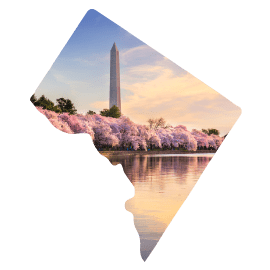Middle School Content Knowledge: District of
Columbia
Secondary Teacher Preparation Policy
Analysis of District of Columbia's policies
Content Test Requirements:
All new middle school teachers in the District of Columbia are required to pass a single-subject Praxis II content test to attain licensure; a general content knowledge test is not an option.
The District of Columbia also allows teachers to add a middle school endorsement to an elementary or secondary certification by either completing coursework or passing a content test.
The District of Columbia requires enrollment in but not completion of, a teacher preparation program in order to obtain an initial license. While this initial license is non-renewable, it is valid for three years. Teachers must complete a teacher preparation program and complete other requirements, including passage of a basic skills test and a pedagogy test, in order to obtain a standard license.
Academic Requirements:
The District of Columbia does not explicitly require a major or minor in the subject areas that candidates plan to teach.
Recommendations for District of Columbia
Ensure that content tests adequately measure sufficient knowledge in all subjects.
The District of Columbia should ensure that its subject-matter tests for middle school teacher candidates is sufficiently rigorous, the District should ensure that the required passing scores on each test reflect high levels of performance. Doing so will help to ensure that every student is taught by a teacher with adequate subject-matter knowledge.
Close the loophole that allows teachers to add middle-grade levels to an existing license without demonstrating content knowledge.
NCTQ urges the state to require that all teachers who add the
middle-grade levels to their certificates pass a rigorous
subject-matter test to ensure content knowledge of all subject areas
before they teach in a classroom as the teacher of record.
Strengthen middle school teachers' subject-matter preparation.
The District of Columbia should encourage middle school teachers to earn two subject-matter
minors. This would allow candidates to gain sufficient knowledge to pass
District licensing tests, and it would increase schools' staffing
flexibility. However, middle school candidates in the District who intend to teach a single subject should earn a major in that area.
State response to our analysis
The District of Columbia was helpful in providing NCTQ with facts necessary for this analysis. The District of Columbia also stated that it requires all candidates to demonstrate subject matter proficiency by passing the Praxis II subject content knowledge exams to meet educator preparation program's admission requirements. For subjects where a Praxis II subject content knowledge exam is not available or has not been adopted, programs must require candidates to hold a completed degree or its equivalent with a major in the subject area to demonstrate subject-matter proficiency for admission.
Updated: December 2017
Select another topic
General Teacher Preparation
- Program Entry
- Teacher Shortages and Surpluses
- Program Performance Measures
- Program Reporting Requirements
- Student Teaching/Clinical Practice
- Teaching Methods
Elementary Teacher Preparation
Secondary Teacher Preparation
- Middle School Content Knowledge
- Middle School Licensure Deficiencies
- Adolescent Literacy
- Secondary Content Knowledge
- Secondary Licensure Deficiencies
Special Education Teacher Preparation
Alternate Routes
Hiring
- Requirements for Out-of-State Teachers
- Provisional and Emergency Licensure
- Licensure for Substitute Teachers
- Supporting New Teachers
Teacher and Principal Evaluation
Teacher Compensation
Retaining Effective Teachers
Early Childhood Preparation
How we graded
3A: Middle School Content Knowledge
- Content Tests: The state should require that all new middle school teachers pass a separately scored subject-matter test in every core academic area for which they are licensed to teach.
The total goal score is earned based on the following:
- Full credit: The state can earn full credit if it offers a middle school license and requires teachers to pass a licensing test in every core academic area in which they are licensed to teach.
- One-quarter credit: In some cases, a state can earn one-quarter of a credit for mitigating the negative aspects of a K-8 license, for example, requiring a single subject test to teach that subject at the middle school level.
- 0/0 credit: The state will not earn any credit if it only offers a K-8 license and only requires an elementary content test.
Research rationale
Middle school grades are critical years of schooling. It is in these years that far too many students fall through the cracks. However, requirements for the preparation and licensure of middle school teachers can be especially problematic. States need to distinguish the knowledge and skills needed by middle school teachers from those needed by an elementary teacher. Whether teaching a single subject in a departmentalized setting or teaching multiple subjects in a self-contained setting, middle school teachers must be able to teach significantly more advanced content than elementary teachers. In order to do so, middle school teachers must be deeply knowledgeable about every subject they will be licensed to teach, and able to pass a licensing test in every core subject to demonstrate this knowledge.[1] The notion that someone should be identically prepared to teach first grade or eighth grade mathematics seems ridiculous, but states that license teachers on a K-8 generalist certificate essentially endorse this idea.
[1] For additional research on the importance of subject matter knowledge, see: Dee, T. S., & Cohodes, S. R. (2008). Out-of-field teachers and student achievement: Evidence from matched-pairs comparisons. Public Finance Review, 36(1), 7-32.; Chaney, B. (1995). Student outcomes and the professional preparation of eighth-grade teachers in science and mathematics. NSF/NELS: 88 Teacher Transcript Analysis. Retrieved from http://eric.ed.gov/?id=ED389530; Weglinsky, H. (2000). How teaching matters: Bringing the classroom back into discussions of teacher quality (Policy Information Center report). Princeton, NJ: Educational Testing Service. Retrieved from http://www.ets.org/Media/Research/pdf/PICTEAMAT.pdf ; A report published by the National Mathematics Advisory Panel (NMAP) concludes that a teacher's knowledge of math makes a difference in student achievement. National Mathematics Advisory Panel. (2008). Foundations for success: The final report of the National Mathematics Advisory Panel. US Department of Education. Retrieved from http://www2.ed.gov/about/bdscomm/list/mathpanel/report/final-report.pdf

